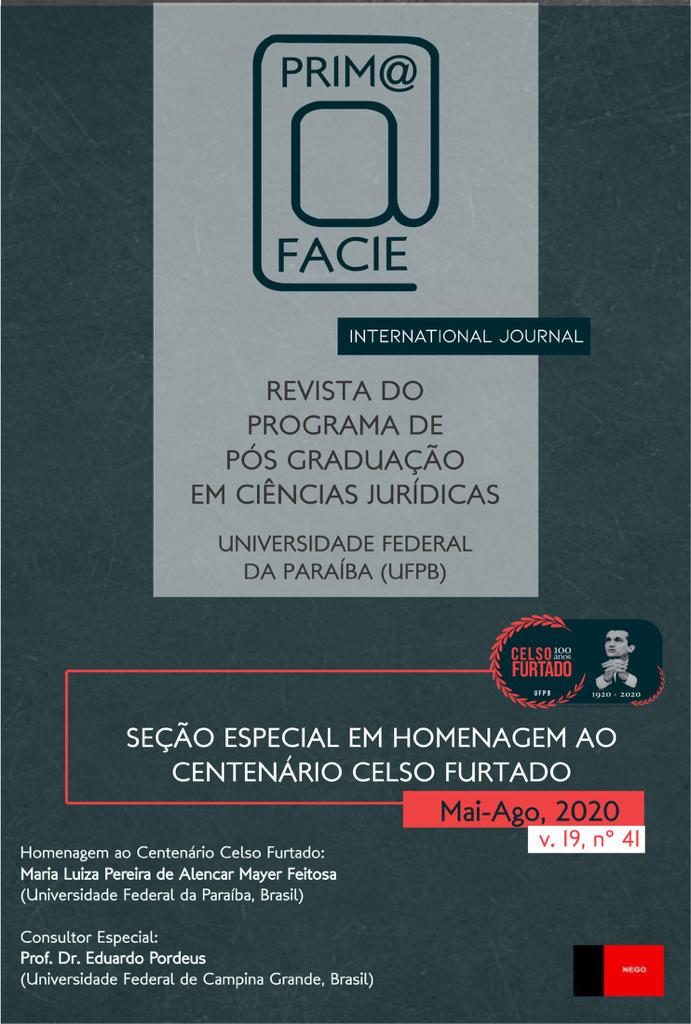The Law Of The People As A Discourse: The International Slave Trade In The Light Of Legal Knowledge (1839-1850)
DOI:
https://doi.org/10.22478/ufpb.1678-2593.2020v19n41.44266Keywords:
International Law. International Trafficking of Slaves. Historical and legal comparison. Discourse.Abstract
This article aims to analyze the legal literature on the law of the people and their legal effects in the international debate on the suppression of the slave trade. In this sense, the analysis will pursue how the literature of 19th century law manuals focused on the elements of People's Law to guide legal disputes in relation to the international rules of nations in the 19th century. Therefore, the stage of the People's Law disputes will take into account the political and legal disputes that involved countries like Brazil, Portugal and England with regard to the problems regarding the interruption of the slave trade by the waters of the South Atlantic. In methodological terms, the text starts from the contributions of discourse analysis on the French side. The production of legal meanings in relation to People's Law is illuminated in the sources. In addition, the article will illuminate an interdisciplinary and methodological intersection between History and Law by taking the Law of the People as a discourse / knowledge. Finally, the text will present how the rules of international law were used to give a sense of legality, legitimacy and justice in relation to the permanence or not of the international slave trade.
Downloads
References
ACCIOLY, Hildebrando et al. Manual de direito internacional público. São Paulo: Saraiva, 2011.
ALBUQUERQUE, Pedro Autran da Malta. Elementos do direito das gentes. Pernambuco: Tipografia União, 1851.
ALMEIDA, Paulo Roberto de. Formação da diplomacia econômica no Brasil: as relações internacionais no Império. São Paulo: Senac; Brasília: Funag, 2005.
BENTHAM, Jeremy. Principles of international law. In: Works of Jeremy Bentham. Ed. J. Bowring, Edinburg: William Tait, 1843. v. II. Disponível em: <http://www.laits.utexas.edu/poltheory/bentham/pil/pil.e01.html>.
BOSON, Gerson de Brito Mello. Direito internacional público. Belo Horizonte: Del Rey, 1994.
CERVO, Amado Luiz; BUENO, Clodoaldo. História da política exterior do Brasil. São Paulo: Ática, 1992.
DELGADO, Érika Melek. Identidades em trânsito: o caso dos africanos livres na primeira colônia britânica da África Ocidental. Revista de Ciências Humanas, Viçosa, v. 14, n. 2, 2014. Disponível em: <http://www.cch.ufv.br/revista/pdfs/vol14/artigo5dvol14-2.pdf>.
FERREIRA, Silvestre Pinheiro. Manual do cidadão em um governo representativo, ou principios de direito constitucional, administrativo e das gentes. Paris: Rey et Gravier/J. P. Aillaud, 1834. v. 2.
FLORES, Alfredo. Algumas reflexões sobre o método de estudo de caso no direito. Revista Quaestio Iuris, v. 4, n. 1, 2011. Disponível em: <http://www.e-publicacoes.uerj.br/index.php/quaestioiuris/article/view/10210/7988>.
FOUCAULT, Michel. Arqueologia do saber. Tradução de Luiz Felipe Baeta Neves.7. ed. Rio de Janeiro: Forense Universitária, 2009.
FOUCAULT, Michel. As palavras e as coisas. Tradução de Salma Tannus Muchail. 4. ed. São Paulo: Martins Fontes, 1987.
GRINBERG, Keila. Escravidão e relações diplomáticas Brasil e Uruguai, século 19. In: 4o ENCONTRO ESCRAVIDÃO E LIBERDADE NO BRASIL MERIDIONAL. Anais… Curitiba: UFPR, 2015.
LETWIN, Shirley Robin. On the history of the idea of law. Cambridge University Press, 2005.
LIMA, Rafael Peter de. Diplomacia em xeque: direito das gentes e escravidão na agenda bilateral Brasil-Uruguai. Revista História e Cultura, Franca, 2015.
MALTEZ, José Adelino. Princípios de ciência política: o problema do direito. Lisboa: ISCSO, 1998.
MAMIGONIAN, Beatriz Gallotti. Une modernité imposée et ambigué: la Grande-Bretagne, le Brésil et le projet d’abolition de la traite 1848-1851. In: REIS, Daniel Aarão; ROLLAND, Denis (Coord.). Modernités nationales, modernités importées. Paris: L’Harmattan, 2012.
MATTOSO, Kátia M. de Queirós. Ser escravo no Brasil. Tradução de James Amado. São Paulo: Brasiliense, 2003.
PAIVA, Vicente Ferrer Neto. Elementos de direito das gentes. Lisboa: Universidade de Coimbra, 1839.
ROCHA, Acílio da Silva Estanqueiro. O ideal da paz e o utilitarismo: o europeísmo de Bentham. Barcelona: Universitat, 2002. Sep. de “Retos de larazónpráctica”, 2002.
SECRETO, Maria Verónica. O asilo como direito de “gentes” na tradição espanhola. In: 7o ENCONTRO ESCRAVIDÃO E LIBERDADE NO BRASIL MERIDIONAL. Anais… Curitiba: UFPR, 2015.
SILVA, Leonardo Bruno. O tráfico de escravos nas relações externas de Brasil e Portugal. Tese (Doutorado) — Faculdade de Ciências e Letras de Assis, Unesp, São Paulo, 2014.
SOUZA, Alexandro Ferreira. Silvestre Ferreira e o pensamento político luso-brasileiro do século XIX. Revista de Estudos Filosóficos da UFSJ, São João del-Rei, n. 3, p. 8, 2009.2. Disponível em: <http://www.ufsj.edu.br/portal2repositorio/File/revistaestudosfilosoficos/art2-rev3.pdf>.
VATTEL, Emer de. O direito das gentes. Brasília: UnB/Instituto de Pesquisas das Relações Internacionais, 2004.
ZIMMERMANN, Benédicte; WERNER, Michael. Pensar a história cruzada: entre empiria e reflexibilidade. Textos de História, v. 11, n. 1-2, 2003.


